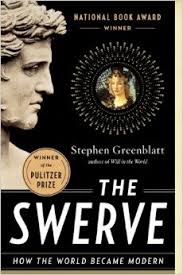The Swerve: How the World Became Modern by Stephen Greenblatt
Stephen Greenblatt won a Pulitzer Prize for this account of how humanist writings by Epicurus and Lucretius survived the Dark Ages, despite vigorous efforts by the Catholic Church to root out and eradicate all manuscripts that challenged the tenets of Christianity. Greenblatt tells how Poggio Braccolini, apostolic secretary to several medieval popes, brought one such book back from oblivion. What Poggio found was a copy of Lucretius’ lengthy poem, “On the Nature of Things,” a comprehensive description of the principles of humanism. Lucretius was a Roman poet whose major influence was the ancient Greek philosopher Epicurus. Writing in third century BCE, Epicurus asserted that the world was composed of atomic matter, existed entirely without supernatural forces, and that human life did not continue after death. He was the first philosopher to emphasize that life is brief and therefore humans should seek fulfillment in improving earthly existence for each other and themselves.
Early Christian scholars, realizing the threat posed by such ideas, labeled Epicurus a blasphemer, and those who followed his philosophy as sinful pleasure-seekers. The Church burned most of the copies of the writings of Epicurus, Lucretius, and others considered heretics. Yet a handful of the forbidden manuscripts lay hidden. As the Renaissance began, several scholars like Poggio went in search of ancient humanist texts, some of them buried in monastic libraries in Germany. Working by hand, scribes copied the humanist writings. Cautiously, texts like Lucretius’ began to circulate within a small group of scholars. Then as now, humanistic philosophy was entirely counter to Catholic Church teachings. But in 15th century Italy, it was also downright dangerous. Anyone who espoused humanism could expect a visit from Inquisitioners. To avoid suspicion, scholars often characterized their finds as “classical poetry.”
Greenblatt’s book, which also won the National Book Award, tells how the rediscovery of Lucretius’ poem launched far-reaching intellectual changes that culminated in “the Enlightenment.” From such change came the development of modern scientific thinking. Countless thinkers from Bruno to Montaigne to Thomas Jefferson, credit Lucretius as a major influence.
This book is a BIG IDEA book, but completely readable. At times, it reads almost like a detective novel, as we follow Poggio in his quest to locate the dusty scrolls that would reacquaint humanity with the profound gifts of the ancient philosophers.
Kathy Curro, March 2014

